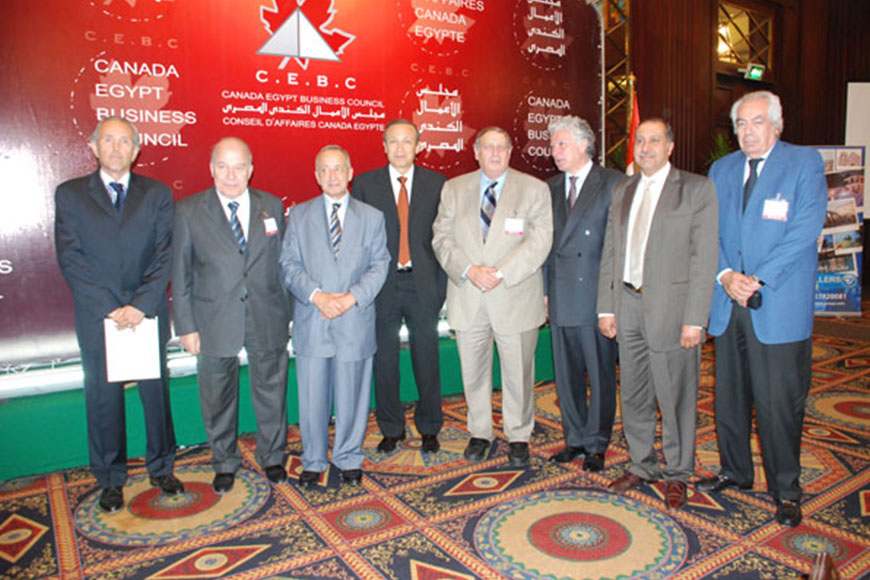
Date
Speaker(s)
Mr. Hany Tawfik
Mr. Karim Helal
Mr. Hassan Hussein
Description
The Canada Egypt Business Council’s Investment Committee hosted a roundtable discussion featuring Dr. Mohamed Abdel Salam, Chairman of Cairo and Alexandria Stock Exchanges to discuss the challenges facing the Stock Exchange after the January 25th revolution and the means to overcome them.
The meeting comes within a series of events aiming at addressing economic and political issues pertaining to Egypt after the revolution. It discussed challenges facing the economy and particularly the stock market at depth, positive steps taken towards stability were also pinpointed and fears of future obstacles and the overall vagueness of the economic situation.
Over 100 prominent attendees attended the event. Mr. Hany Tawfik, Chairman of Arab Private Equity Association and Mr. Karim Helal, Chairman of CI Capital Investment Banking shred the panel with Dr. Abdel Salam. Mr. Hassan Hussein, Chairman of HH Investments Holding and Head of the CEBC Investment Committee moderated the discussion.
CEBC Chairman, Mr. Motaz Raslan, delivered the opening remarks for the discussion by expressing his opinion in the stock exchange, being the ‘thermometer’ of the economy, saying “as an indicator of economic prosperity or lack thereof, the stock exchange has taken a serious downfall, “turning all trading screens red”, and emerged gradually into relatively better performance withstanding extreme circumstances. Raslan explained the ample reasons for the downfall to be the impulsive governmental decisions regarding investment and exchange, major businessmen undergoing legal questioning or involved in corruption cases, among other reasons. “Despite those drastic conditions, we were able to see some green on the trading screens, and that reflects the Stock Exchange’s ability to overcome the most devastating of crises”, concluded Raslan.
Raslan left the mike then to Dr. Mohamed Abdel Salam, who started his speech asserting that CEBC is a true Egyptian family working for the betterment of the country. He then moved on to offer the attendees an overview of the Stock Exchange’s performance during the revolution and since. He stated that the Stock Exchange closed down for fifty five days during and after the revolution. He explained that this happened primarily because banks were not operating, clarifying that it was not the Stock Exchange’s call. On the other hand, he said that when the Stock Exchange reopened, it faced severe opposition from some investors, who took that to the street in the form of demonstrations. Nevertheless, it was empirical to open the stock exchange at the time because any damage was imminent.
The Chairman of the stock exchange then emphasized the bright side of matters speaking of some positive indicators from the investors’ points of views such as their responsiveness to extensive disclosures pertaining shareholders. He also mentioned that their answers were prompt and more transparent than in the past years.
Dr. Abdel Salam acknowledged the numerous challenges facing the economy, while affirming the existence of a feasible roadmap, which, in his point of view, diminished the political risk factor. He elaborated saying that prior to the revolution the question “What if something happens to the president?” comprised a black box, and thus enlarged the political risk factor. Today, on the other hand, the chairman sees that the existence of a roadmap, in the absence of a president and a parliament, is a guarantee to the ability of the country to recover dire conditions. He sees that reform and eradication of corruption taking place simultaneously with the government’s commitment to capitalism, is surely creating a safe and opportune environment for investment in the coming period.
In support of his views, Abdel Salam named various parties from diverse backgrounds, who are dedicating billions of dollars to invest in the Egyptian market, in addition to aids that are flowing in from several countries, namely the U.S., Saudi Arabia and the G8 group.
Dr. Abdel Salam conceded that the country’s economy is going through rough times, yet declared his satisfaction at the gradual recovery taking place. Reflecting on the stock market, he said, “Before the revolution there used to be massive fluctuations in the stock exchange, which were bad for the small investor. He also stated that the Egyptian market had the third best performance worldwide, according to statistics.
Abdel Salam condemned the government’s intention to impose taxes on ‘stock dividend’, which was declared earlier in June of this year and had resulted in a steep drop in the stock exchange indicators. However, he added that upon the backing down on the new tax, the market is now recovering slowly but surely.
Dr. Abdel Salam, then left the floor to Mr. Karim Helal, Chairman of CI Capital Investment Banking, who started his brief speech shedding light on the fact that despite the importance of the stock exchange, it is affected by major factors, to which all scrutiny should be directed and not vice versa.
Helal said, “The world today is looking at a single computer screen where we can all see what is going on all over the world at the same time. We have to examine how the world interprets the development of issues in Egypt”. He sees that the economy is the reason why people went out to Tahrir square in the first place. “Democracy cannot be achieved on an empty stomach”, he added elaborating on the role of the economy in the all-encompassing goal of the revolution. He farsightedly added that the vast numbers of youth comprising 50% of Egypt’s demography are a ticking bomb. He clarified that they have great potential for production, which if not used, will result into an even more ferocious revolution.
The latter resumed on challenges facing the economy saying that the economic inclination at the current time is indistinguishable. He added that the leadership is declaring that capitalism is the economic mode adopted, yet its actions show otherwise. Helal also criticized the corrosion of the credibility of the state as a business partner with other international entities and the gravity of the issue.
Helal concluded his speech saying that the stock exchange is yet to perform its true function as a key player in the economic growth calling for regaining the small investor’s trust in the stock exchange.
Mr. Hani Tawfik, Chairman of Arab Private Equity Association, assumed the floor next, starting his speech commenting on his predecessor’s speakers saying, “Dr. Abdel Salam sees the full half of the glass and Mr. Helal sees the empty part, I, however, don’t see the glass at all.”
Mr. Tawfik harshly criticized the stock dividend tax that the government announced imposing. He said that imposing a tax at this critical time was incorrect and that going back on the decision was equally incorrect. Mr. Tawfik denounced the government taking long-term decisions today.
He, then, illustrated the decline in value of certain companies’ stocks such as Sodic, Palm Hills, Ezz Steel and others. Thus, Mr. Tawfik called for the immediate settlement of property suits by the government shedding light on the dire need for an investment minister capable of taking charge of investment in Egypt. Ending his speech, he drew the attendees’ attention to the legal inadequacy of the stock exchange law that was issued back in the 19th century and is in stern need for reformation or complete redrafting.
The floor was then opened to the attendees’ comments and contributions. Comments and questions varied; some were asserting the positive side of the status, others were fixated on the grim one. Attendees spoke of Egypt’s relative satisfactory overall performance in comparison to its counterparts undergoing similar circumstances. Others affirmed that instability is imminent until a president is in charge and has clear-cut stands on the economy. Dr. Mostafa Al Saeed, former minister of economy, spoke of the revolution’s economic price observing that the constant deterioration of the economy that was taking place before the revolution, has been halted and that is valuable gain in its own right. He also assured that regardless of which faction comes into power, there shall never be another form of economic ideology other than capitalism adopted.

















